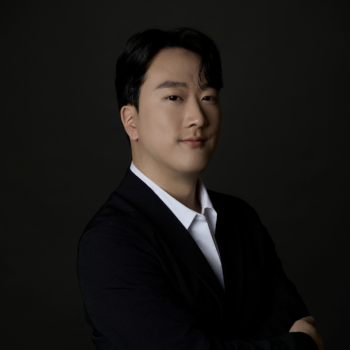
Matthew Jihoon Pellegrino is an award-winning composer, Fulbright researcher, and devoted music educator. He has previously taught at the Peabody Institute of Johns Hopkins, Usdan Summer Camp for the Arts, and the Park School of Baltimore. Uncompromising in his work, Pellegrino seeks to create music that engages equally with casual audiences as well as the most serious of listeners. In his music he most enjoys exploring personal themes while incorporating touches of dark humor.
Matthew's work has been performed in New York, Chicago, Boston, Houston, Baltimore, Seoul, and Finland. In 2022 he was awarded a Fulbright Research Grant to conduct his doctoral research on traditional music in South Korea. He was then commissioned by the Dareumi Gahteum Project to compose and arrange an evening of music combining elements of the Western classical canon with Korean traditional melodies through an ensemble comprised of instruments from both cultures. His work, Anxiety Cycles, received its premiere at Symphony Center, Chicago IL as part of a co-commission by Sound Mind and the Civic Orchestra of Chicago for their musicians and mental health initiative. Dear Mother: A Transracial Adoption Story received a virtual ballet production in collaboration with Boston Korean Adoptees and KAAN: Korean American Adoptive Family Network. In 2016, Matthew's Winter Unending, Invincible Summer won the Charles B. Olson award, and has since been performed by The Guards Band of Finland, the Peabody Wind Ensemble, and recorded by the Encore Wind Ensemble. His works have been performed by The Guard's Band, the Civic Orchestra of Chicago, Peabody Wind Ensemble, University of Massachusetts at Amherst Symphonic Band, Fredonia State University Wind Ensemble, Kent State University New Music Ensemble, and MezzoBlasto Clarinet Quartet.
Born as Jihoon Lee (이지훈) in South Korea, Matthew was raised on Long Island, New York. He completed his Doctor of Musical Arts and Master of Music degrees with Oscar Bettison at the Peabody Conservatory of Johns Hopkins University, where he received the Dean's Doctoral Fellowship. During his time at Fredonia State University of New York he studied Music Composition with Dr. Rob Deemer, Dr. Sean Doyle, and Dr. Karl Boelter, and Oboe Performance with Mark Dubois. Equally active as a teacher, Matt currently serves on faculty at New York University's Steinhardt School, and directs the composition and songwriting program at the Usdan Summer Camp for the Arts.
